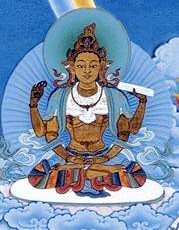Prajnaparamita

Prajñaparamita (Skt. prajñāpāramitā; Tib. ཤེར་ཕྱིན་, ཤེས་རབ་ཀྱི་ཕ་རོལ་ཏུ་ཕྱིན་པ་, sherchin, sherab kyi parol tu chinpa, Wyl. sher phyin, shes rab kyi pha rol tu phyin pa) means 'Perfection of Wisdom', or more literally, ‘transcendent wisdom’. It refers to:
- the sixth of the paramitas: perfect non-conceptual wisdom.
- the class of Buddhist literature that was mainly discovered by Nagarjuna in the second century. Its central topic is emptiness.
- the female deity who is the embodiment of transcendent wisdom.
Definition
"Prajnaparamita is the wisdom of directly realizing the non-conceptual simplicity of all phenomena, which has arrived at, or will lead one to, non-abiding nirvana."[1]
Subdivisions
According to the teachings of the Abhisamayalankara, there are four subdivisions:
- natural prajnaparamita
- scriptural prajnaparamita
- path prajnaparamita
- resultant prajnaparamita
Literature
All of the prajñaparamita sutras can be classified in the
In the Tibetan canon, all these texts can be found at the beginning of the Sutra collection of the Kangyur (Toh 8-30).
What, in General Terms, do the Perfection of Wisdom Sutras Teach?
Elaborating on all the different kinds of experienced phenomena in sets (Skt. matṛkā or “matrices”), in a manner similar to the abhidharma traditions characteristic of Buddhism from its earliest stages, the long Perfection of Wisdom sutras explain how each and every category in turn is ultimately empty.
In this context, wisdom (Tib. shes rab; Skt. prajña), the antidote to the ignorance that lies at the root of all suffering, means the recognition that all phenomena are ultimately empty of any intrinsic or unchanging nature of their own. Every phenomenon that we experience—from the physical ‘things’ that surround us, experienced through our senses, to our innumerable mental constructs, concepts, and ideas—likewise lack any essential or intrinsic, unchanging nature of their own. This is sometimes called the “selflessness of things.” Wisdom, in this sense, also means the recognition that neither we, nor any part of ourselves, has any intrinsic or essential nature—no “soul” and no “self.” This is sometimes called the selflessness (Skt. anātman; Tib. bdag med) of persons.
Nothing that we perceive or experience exists in the way that it is perceived, since the objects of our experience, as well as the experiences themselves, are dependent upon, and conditioned by, innumerable factors, not least of which are the innately dualistic tendencies of the mind. In this way, all phenomena are “empty” (Tib. stong pa; Skt. śunya)—they are not real, since they do not exist “from their own side” in the way that we experience them.
Crucially, in the Perfection of Wisdom discourses, it is not just the person and phenomena—whether physical, perceptual, or mental—that are recognized as empty, but also the very path itself, including all those constructions we rely upon as we traverse the path. Even the perfections that we practice and cherish, even the bodhisattva conduct we aspire to, are empty of intrinsic nature. Furthermore, in the Perfection of Wisdom, even the fruit of the path, the stages, and ultimately even buddhahood itself, is recognized as empty.
At the same time, in the great, hard-to-fathom paradox which is also central to the profound view, all phenomena share in the true and ultimate, ineffable nature of emptiness, as unborn and unceasing.
It is only through wisdom that true liberation from all attachment can be attained. A wisdom without any reference points at all is hard won, but the great Perfection of Wisdom sutras also offer a process through which to progress on the path toward its realization.
While deconstructing, with relentless elaboration, the ways in which the elements of the path and its results are empty and must not be grasped as truly existent, the Perfection of Wisdom sūtras also describe them in detail and set out an order in which bodhisattvas may “practice” and integrate them into their understanding, experience, and realization.
The Perfection of Wisdom sutras, therefore, take the bedrock of the abhidharma and use it to delineate both a profound view of the real nature of things, and also a vast scheme of practice by which to realize that view—the key components of the Mahāyāna tradition.[2]
Notes
- ↑ From The Words of Jikme Chökyi Wangpo by Khenpo Tsöndrü.
- ↑ Source: 84000's editorial team